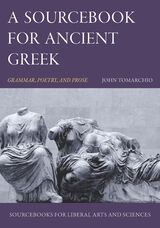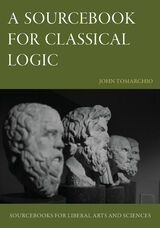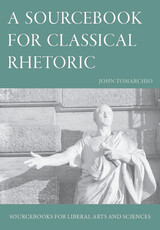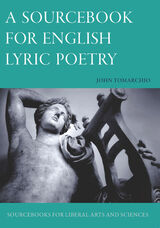4 books about Tomarchio, John

A Sourcebook for Ancient Greek
Grammar, Poetry, and Prose
John Tomarchio
Catholic University of America Press, 2022
This book was designed for students transitioning from the study of Greek grammar to translation of texts. It was developed in classroom use for classroom use, in the context of an integrated Great Books program in liberal arts and sciences. It is meant for students not only of Classics, but more, for students of Humanities interested in direct engagement of primary sources. Each Greek text offered for translation was chosen for its theoretical interest as well as the interest of its Greek.
The selections of Greek literature offered in this Sourcebook are wide-ranging. The indisputable standard of excellence for classicists is of course the Attic dialect of Athens in its glory. However, this Sourcebook is meant for students of liberal arts and sciences whose interests range far more widely. Thus, it does not hesitate to extend not only backward to the archaic Greek of Homer, but also forward to the koine Greek of the Alexandrian and Roman empires. Greek works were chosen for being seminal to Western thinking today, chosen to give students of Western arts and sciences introductions to its Greek sources
Naturally, Greek grammar is taught to the newcomer analytically and sequentially, but the continuing student needs to synthesize these distended enumerations of elements and principles. Accordingly, grammatical synopses are not appended as reference tables but placed front and center as objects of study. The grammar tables offer synoptic views of integral parts of Greek grammar to show the form and logic of the whole part of speech or part of a sentence. On the basis of these tables, detailed grammatical notes and commentary appended to Greek selections that follow are tailored for continuing students.
[more]

A Sourcebook for Classical Logic
John Tomarchio
Catholic University of America Press, 2023
This Sourcebook offers a brief sequence in classical Logic befitting an unspecialized study for students of liberal arts and sciences. The sequence is made up of select texts of the Aristotelian Organon, mostly the opening chapters of each treatise, in the traditional order, where Aristotle lays out the primary elements of reasoning. Study aids accompany these primary texts, providing students with mnemonics and diagrams developed for classroom use in the great books programs St. John’s College. The culmination of this Aristotelian Logic sequence is selections from the Posterior Analytics where Aristotle offers an account of the demonstrative reasoning of theoretical sciences. The interest of this Sourcebook, as of Aristotelian Logic, is search for such knowledge.
This Aristotelian sequence is preceded by a sequence of readings in Medieval grammatica speculativa, or philosophy of language. This propaedeutic sequence begins with an ancient source to which that metaphysically minded ‘grammar’ recurred, namely Augustine’s De magistro, or On the Teacher. It is a dialogue between Augustine and his son about the triadic relation of the spoken word to the word thought and the thing thought about. This aporetic dialectic between Augustine and his son proves effective in awakening students to the theoretical stakes of Logic. Similarly, from later theological inquiries into language for purposes of scriptural interpretation more general theories of language emerged. The theoretical uses thus made of Aristotelian Logic by the Jewish theologian Maimonides and the Catholic Thomas Aquinas whet student appetite for the technical matter of the Organon sequence to follow.
[more]

A Sourcebook for Classical Rhetoric
John Tomarchio
Catholic University of America Press, 2023
This Sourcebook is intended for students of liberal arts and great books. It treats such books as primary sources for inquiring into the nature of human speech because they clarify the terms and stakes of perennial questions thinking human beings ask themselves about persuasive speaking. By crystallizing viable claims about the nature of what we confront in politics and society—live claims for us to confront in our own, with the stakes of that confrontation being live as well—they originate a dialectic with one another and with us their readers.
Cicero called rhetoric a liberal art necessary for every citizen of a free republic. In the polities of ancient Greece and Rome, rhetoric was politically potent because oratory was the regular means of political decision. Words were decisive, often a matter of life and death, not merely for individuals but for peoples. In human milieux where human speech is so politically decisive, reflection upon its nature became keen.
The selections of this sourcebook have been arranged in three sequences. The first two sequences comprise philosophical dialogues on the ends of rhetoric. Selections from Plato’s Gorgias, Phaedrus, and Apology examine the rhetorician or teacher of rhetoric, and then Cicero’s De oratore offers us a dialectic among practitioners about its practice. The philosophical dialogues on the art’s intended ends and causative effects provide the theoretical and ethical context for examining its means. These philosophical dialogues are thus propaedeutic to the third sequence, which focusses on the art itself with selections from Aristotle’s treatise On Rhetoric, paired with orations from Thucydides’ History of the Peloponnesian War.
[more]

A Sourcebook for English Lyric Poetry
John Tomarchio
Catholic University of America Press, 2023
This Sourcebook is not a survey of English lyric poems but rather a florilegium. It singles out great poems of the last five centuries worthy of study in liberal education—in Great Books programs, Core curricula, and the Humanities generally. The poems were selected not as representative of the author’s time or oeuvre, but rather as addressed to the reader and the reader’s time by virtue of their representing the nature of things. That is what makes a poem great and worthy of inquiry, in John Tomarchio’s judgement. The capacities, needs, and interests of students of such great poetry were the principles of selection.
To arrange the great poems selected Tomarchio looked to their meters as a formal measure intrinsic to them, rather than to epochal divisions. The paradigmatic example of this is the classical English sonnet. Many an English poet has submitted themselves to the self-discipline of this poetic form born in the classical period of English poetry in Tudor England. But what of such historical context? When Robert Frost chooses to write a sonnet in the 20th century, why associate it more with the free verse of e.e. cummings than of the quincentenary sonnet tradition his chosen form invokes for context?
The Sourcebook arranges poems according to five such metrical modes, however along with an Index by poet as well . Tomarchio’s enumeration of poetic modes does not presume to be either exhaustive or normative, but rather interpretative of poetic practices and hopefully more elucidative than historical considerations. Further, as understanding great poetry’s means deepens interpretation of ends, the Sourcebook begins with a propaedeutic “grammar” that introduces students to such devices of poetic art as meter, rhyme, and trope.
[more]
READERS
Browse our collection.
PUBLISHERS
See BiblioVault's publisher services.
STUDENT SERVICES
Files for college accessibility offices.
UChicago Accessibility Resources
home | accessibility | search | about | contact us
BiblioVault ® 2001 - 2024
The University of Chicago Press









